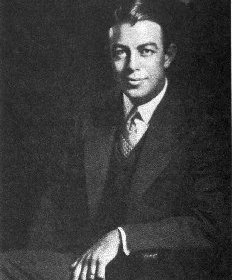Related Research Articles

Benjamin Lee Whorf was an American linguist and fire prevention engineer best known for proposing the Sapir–Whorf hypothesis. He believed that the structures of different languages shape how their speakers perceive and conceptualize the world. Whorf saw this idea, named after him and his mentor Edward Sapir, as having implications similar to those of Einstein's principle of physical relativity. However, the concept originated from 19th-century philosophy and thinkers like Wilhelm von Humboldt and Wilhelm Wundt.
Linguistic relativity asserts that language influences worldview or cognition. One form of linguistic relativity, linguistic determinism, regards peoples' languages as determining and influencing the scope of cultural perceptions of their surrounding world.

Friedrich Wilhelm Christian Karl Ferdinand von Humboldt was a German philosopher, linguist, government functionary, diplomat, and founder of the Humboldt University of Berlin. In 1949, the university was named after him and his younger brother, Alexander von Humboldt, a naturalist.
Dell Hathaway Hymes was a linguist, sociolinguist, anthropologist, and folklorist who established disciplinary foundations for the comparative, ethnographic study of language use. His research focused upon the languages of the Pacific Northwest. He was one of the first to call the fourth subfield of anthropology "linguistic anthropology" instead of "anthropological linguistics". The terminological shift draws attention to the field's grounding in anthropology rather than in what, by that time, had already become an autonomous discipline (linguistics). In 1972 Hymes founded the journal Language in Society and served as its editor for 22 years.

The Hopi are Native Americans who primarily live in northeastern Arizona. The majority are enrolled in the Hopi Tribe of Arizona and live on the Hopi Reservation in northeastern Arizona; however, some Hopi people are enrolled in the Colorado River Indian Tribes of the Colorado River Indian Reservation at the border of Arizona and California.
Linguistic anthropology is the interdisciplinary study of how language influences social life. It is a branch of anthropology that originated from the endeavor to document endangered languages and has grown over the past century to encompass most aspects of language structure and use.
A sprachbund, also known as a linguistic area, area of linguistic convergence, or diffusion area, is a group of languages that share areal features resulting from geographical proximity and language contact. The languages may be genetically unrelated, or only distantly related, but the sprachbund characteristics might give a false appearance of relatedness.

The four cardinal directions, or cardinal points, are the four main compass directions: north, south, east, and west, commonly denoted by their initials N, S, E, and W respectively. Relative to north, the directions east, south, and west are at 90 degree intervals in the clockwise direction.
Hopi is a Uto-Aztecan language spoken by the Hopi people of northeastern Arizona, United States.
Linguistic determinism is the concept that language and its structures limit and determine human knowledge or thought, as well as thought processes such as categorization, memory, and perception. The term implies that people's native languages will affect their thought process and therefore people will have different thought processes based on their mother tongues.

The Uto-Aztecan languages are a family of native American languages, consisting of over thirty languages. Uto-Aztecan languages are found almost entirely in the Western United States and Mexico. The name of the language family reflects the common ancestry of the Ute language of Utah and the Nahuan languages of Mexico.

Kenneth Locke Hale, also known as Ken Hale, was an American linguist at the Massachusetts Institute of Technology who studied a huge variety of previously unstudied and often endangered languages—especially indigenous languages of North America and Australia. Languages investigated by Hale include Navajo, O'odham, Warlpiri, and Ulwa.

The Qatsi trilogy is a series of three non-narrative films produced by Godfrey Reggio and scored by Philip Glass. The trilogy includes Koyaanisqatsi (1982), Powaqqatsi (1988), and Naqoyqatsi (2002).
Robert Malcolm Ward "Bob" Dixon is a Professor of Linguistics in the College of Arts, Society, and Education and The Cairns Institute, James Cook University, Queensland. He is also Deputy Director of The Language and Culture Research Centre at JCU. Doctor of Letters, he was awarded an Honorary Doctor of Letters Honoris Causa by JCU in 2018. Fellow of British Academy; Fellow of the Australian Academy of the Humanities, and Honorary member of the Linguistic Society of America, he is one of three living linguists to be specifically mentioned in The Concise Oxford Dictionary of Linguistics by Peter Matthews (2014).

The Awatovi Ruins, spelled Awat'ovi in recent literature, are an archaeological site on the Hopi Reservation in northeastern Arizona, United States. The site contains the ruins of a pueblo estimated to be 500 years old, as well as those of a 17th-century Spanish mission. It was visited in the 16th century by members of Francisco Vázquez de Coronado's exploratory expedition. In the 1930s, Hopi artist Fred Kabotie was commissioned by the Peabody Museum of Archaeology and Ethnology of Harvard University to reproduce the prehistoric murals found during the excavation of the Awatovi Ruins. The site was designated a National Historic Landmark in 1964.

Hopi Dictionary/Hopìikwa Lavàytutuveni: A Hopi–English Dictionary of the Third Mesa Dialect is a Hopi–English bilingual dictionary compiled by the Hopi Dictionary Project, a research team based at the Bureau of Applied Research in Anthropology at the University of Arizona. It was published in 1998 by the University of Arizona Press.

The Hopi time controversy is the academic debate about how the Hopi language grammaticizes the concept of time, and about whether the differences between the ways the English and Hopi languages describe time are an example of linguistic relativity or not. In popular discourse, the debate is often framed as a question about whether the Hopi have a concept of time.

Paul V. Kroskrity is an American linguistic anthropologist known primarily for his contributions to establishing and developing language ideology as a field of research. He is professor of anthropology, applied linguistics, and American Indian Studies at the University of California, Los Angeles. He is the past President of the Society for Linguistic Anthropology and past Chair of the American Indian Studies program at the University of California, Los Angeles.
Claus Peter Zoller is a linguist and professor of South Asian Studies at the Department of Culture Studies and Oriental Languages of the University of Oslo. His research interests include Hindi literature and linguistics, the languages of the Western Himalayas and northern Pakistan (Dardic), cultural traditions and ethnography of those regions, as well as Romani linguistics. He is known for his work on the documentation of Indus Kohistani and Bangani, and his broader work on the linguistic history of Indo-Aryan languages.
Alexander MacGregor Stephen was a Scottish-American amateur ethnographer. A miner who emigrated from Scotland to the United States, he spent time with the Hopi of First Mesa and Navajo observing their daily lives.
References
- Geertz, Armin (2000). "Rethinking Hopi Ethnography by Peter M. Whiteley". Anthropos (review). 95 (1): 312–313. JSTOR 40465937.
- Hopi Dictionary Project, (University of Arizona Bureau of Applied Research in Anthropology) (1998). Hopi Dictionary: Hopìikwa Lavàytutuveni: A Hopi-English Dictionary of the Third Mesa Dialect with an English-Hopi Finder List and a Sketch of Hopi Grammar . Tucson, Arizona: University of Arizona Press. ISBN 0-8165-1789-4.
- Leavitt, John (2011). Linguistic Relativities: Language Diversity and Modern Thought. Cambridge, UK: Cambridge University Press. ISBN 978-0-521-76782-8.
- Malotki, Ekkehart (1979). Hopi-Raum: Eine sprachwissenschaftliche Analyse der Raumvorstellungen in der Hopi-Sprache (in German). Tübingen: Gunter Narr Verlag.
- Malotki, Ekkehart (1983). Hopi Time: A Linguistic Analysis of the Temporal Concepts in the Hopi Language. Trends in Linguistics. Studies and Monographs. Vol. 20. Berlin, New York and Amsterdam: Mouton Publishers.